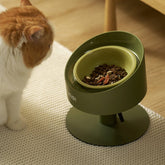Understanding and Preventing Roundworm in Cats
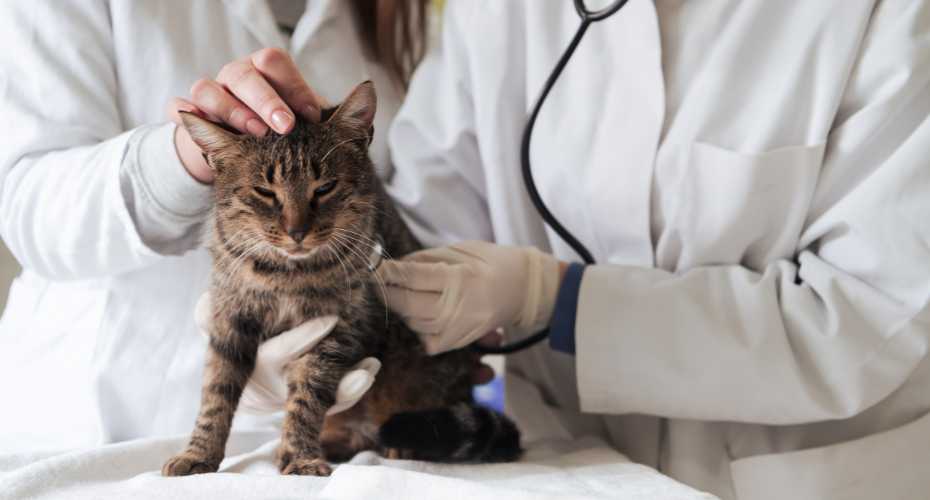
As a cat owner, you undoubtedly want to provide the best possible care for your furry friend. Regrettably, having roundworms in their cats is a common problem that many cat owners may need to address.
Cats are susceptible to contracting roundworms, a type of parasitic worm that can lead to a number of health issues. In this blog post, we'll discuss what roundworms are, how cats get them, how to tell if your cat has them, and most importantly, how to prevent and treat them.
We know how stressful and worrying it may be to have a cat with roundworms. Our goal is to provide you with the knowledge you need to keep your cat healthy and free of these bothersome parasites. So, let's dive in and learn more about roundworms on cats!
What are Roundworms on Cats?
Roundworms are a type of parasitic worm that can infect cats. As their name suggests, they are long and cylindrical and can grow to be several inches long. Roundworms live in the intestines of infected cats and feed off of their host, which can cause a range of health problems if left untreated.
There are two types of roundworms that commonly infect cats: Toxocara cati and Toxascaris leonina. Toxocara cati is more common and can also infect humans, especially young children, causing a condition known as toxocariasis. Cats can become infected with roundworms by ingesting the worm's eggs, which are released in the feces of infected cats.
Once ingested, the eggs of the parasitic roundworm hatch in the cat's intestine. The larvae then migrate to various organs, including the liver and lungs, before returning to the intestine to develop into adult worms. Each adult roundworm can produce thousands of eggs per day, which are passed in the cat's feces and continue the cycle of infection.
Roundworms are one type of parasitic infection that can occur in cats. These infections can cause a range of symptoms, including vomiting, diarrhoea, weight loss, a pot-bellied appearance, and a dull coat. In severe cases, roundworms can cause intestinal blockages, leading to life-threatening complications.
Just like humans, it's important for cats to regularly rid their system of parasites - specifically, roundworms. Deworming, good hygiene practices, and routine veterinary care can help keep your cat healthy and parasite-free. Not to mention, it's also important for the people around them. No one wants to catch a parasite from their feline friend!
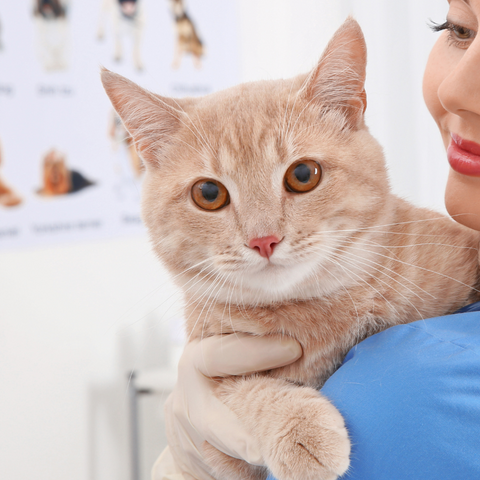
Symptoms of Roundworms on Cats
Cats infected with roundworms may display a range of symptoms, which can vary depending on the severity of the infection. Here are some common symptoms to look out for:
Vomiting
Roundworms can irritate the stomach and intestines of cats, resulting in vomiting. It is possible to see live or dead worms in the vomit, which can be an unsettling sight for owners.
Diarrhoea
Roundworms in a cat's intestine can cause loose or watery stools. This can range from mild to severe and may contain mucus, blood, or actual worm segments. Straining to defecate, or having accidents outside the litter box can also be signs of roundworm infestation. Dehydration, malnutrition, and weight loss can occur, especially in kittens or cats with weak immune systems.
Reduced appetite
Cats infested with roundworms may be less inclined to eat. This can be a concern, as inadequate nutrition can lead to malnourishment. Additionally, a weakened immune system can make cats more susceptible to other diseases.
Weight loss
When a cat has roundworms, the parasites steal nutrients from its intestines, resulting in malnutrition and weight loss. In some cases, the weight loss may be very minor or not noticeable. However, severe infections can cause cats to lose a large amount of weight, which can be especially dangerous for young or old cats who may not be able to handle the loss of nutrients as well as healthy adult cats.
Lethargy
Lethargy in cats may indicate a roundworm infection and suggest that the cat is uncomfortable or the infection is causing damage. Cats with roundworms may be less active, playful, and responsive.
Pot-bellied appearance
Severe roundworm infections in cats can cause a pot-bellied appearance, which is a sign of damage to the cat's digestive system. This happens because the roundworms can multiply rapidly and take up space in the cat's intestines.
As the worms continue to grow and multiply, they can cause the cat's intestines to become distended, leading to a swollen or bloated appearance in the cat's belly. This is especially noticeable in young kittens.
No symptoms
Unfortunately, cats can sometimes show no symptoms of roundworm infection. Regular vet check-ups and fecal exams help ensure your cat is parasite-free.
Roundworms are a common problem in cats, and if you think your cat may have them, it's important to take them to the vet right away. Your vet can perform tests to diagnose the problem and prescribe appropriate treatment to help your cat recover.
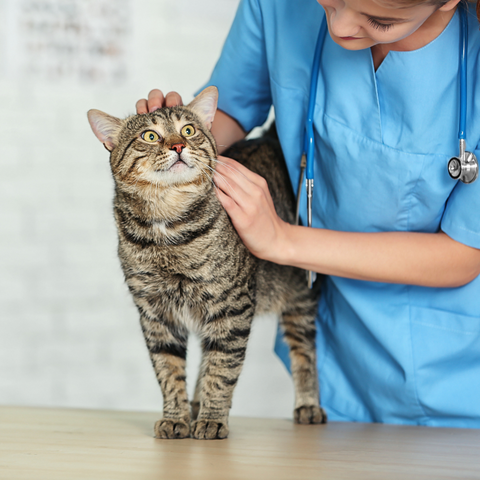
How to Prevent Roundworms on Cats
The good news is that roundworms are preventable. To do so, consider the following:
Regular Vet Check-Ups and Deworming
Regular trips to the vet are essential for keeping your cat healthy, detecting health problems, and preventing roundworm infection. During a routine check-up, the vet can do a fecal test to look for roundworm eggs or other parasites in your cat's stool. If roundworms are present, the vet can give the right medication to treat the infection.
Deworming medication is the most common treatment for roundworm infection in cats. The medication is designed to kill the worms and prevent them from reproducing. Depending on the severity of the infection, multiple doses of medication may be required to completely eliminate the roundworms.
It's important to follow your vet's instructions for administering a deworming medication, as incorrect dosage or timing can lead to ineffective treatment or re-infection. Your vet may also recommend additional preventative medication to protect against future infections.
Proper Hygiene and Cleaning
To reduce the risk of your cat getting a roundworm infection, there are a few practices you can follow. To begin with, regularly clean the litter box and always wash your hands after handling your cat. Additionally, avoid exposing your cat to contaminated soil, feces, or infected animals. When introducing a new pet to your home, ensure that they have been properly screened and treated for parasites.
Managing Cat's Environment and Diet
Keeping cats indoors can reduce the risk of roundworm infection. This is because they are less likely to come into contact with contaminated soil, infected prey, and other animals that may be carriers of the parasite. When cats are indoors, they are less likely to come into contact with roundworm eggs in the environment, which can help reduce their risk of infection.
If you have an outdoor cat, you'll want to take extra precautions to protect them from roundworm infection. This includes screening new pets for parasites before you introduce them into your home.
Treatment for Roundworms on Cats
If your cat contracts roundworms, there are several treatments available. Medication can help eliminate the parasites and follow-up care can prevent re-infection.
Your vet will monitor your cat during treatment to ensure they are making progress and may suggest further tests to ensure the infection has cleared. It is essential that you follow your vet's appointments and advice to ensure your cat receives the best care.
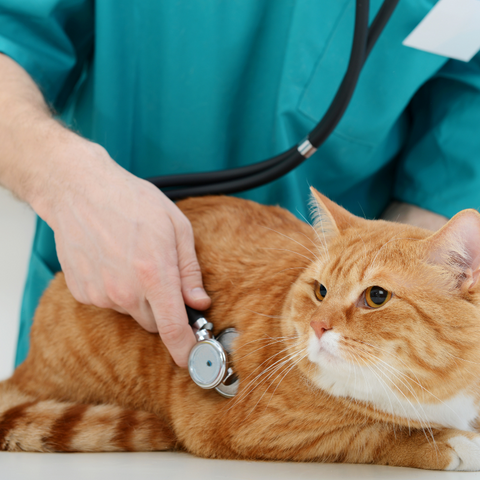
Conclusion
Roundworms are a common problem in cats, but they are preventable. By taking preventative measures and seeking treatment when necessary, cat owners can keep their furry friends healthy and happy. Remember, regular visits to the vet, proper hygiene and cleaning, and managing your cat's environment and diet can help prevent roundworms in cats.






















